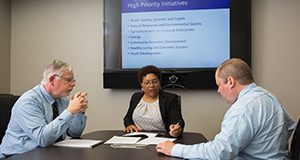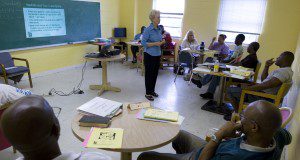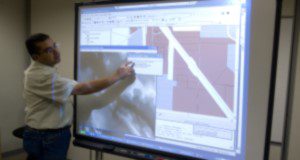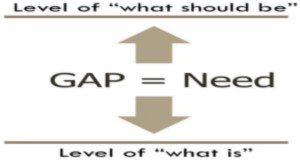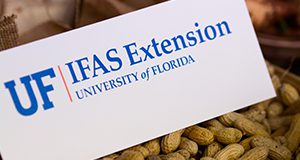Proposals possessing sound and well-funded evaluation plans are normally stronger and have greater chances of being funded. This new 4-page publication of the UF/IFAS Department of Agricultural Education and Communication shares information the authors learned during a series of meetings with federal agency program officers and evaluators about best practices for grant proposals. The practices encompass two broad categories: incorporating evaluation expertise into the project team and building a sound project rationale and evaluation plan. By adopting these practices, you will enhance the quality of your proposals; you will most likely increase the amount of extramural funding that is secured; and you will elevate the visibility and impact of programs within your organization. Written by Glenn Israel, Jaclyn D. Kropp, David C. Diehl, Conner Mullally, and Sebastian Galindo.
https://edis.ifas.ufl.edu/wc350
Tag: Department of Agricultural Education and Communication
Exemplary Youth Leadership Series: Inspire a Shared Vision
This publication series is designed to outline strategies and experiences to expose youth to and engage them with leadership concepts. In this series, activities have been developed to introduce youth to Kouzes and Posner’s five practices of exemplary leaders. This new 2-page article allows students to engage with the second practice: inspiring a shared vision. Leaders shape the trajectory of their organization. The two outlined activities help students illustrate the idea of creating a unique vision and recruiting others to follow that vision. Written by Megan Stein and published by the UF/IFAS Department of Agricultural Education and Communication.
https://edis.ifas.ufl.edu/wc348
Conducting the Needs Assessment #2: Using Needs Assessments in Extension Programming
This second publication in the Conducting the Needs Assessment series provides Extension educators and other service providers with a foundational underpinning of how the needs assessment fits within the program planning process. Both formal and nonformal educators seeking to develop and deliver an educational program must first be informed of what their audience lacks in order to develop the right curriculum or training, and therefore conducting a needs assessment is a priority in the program development process. This new publication of the UF/IFAS Department of Agricultural Education and Communication was written by Matthew Benge and Laura Warner.
https://edis.ifas.ufl.edu/wc347
Exemplary Youth Leadership Series: Model the Way
This publication series is designed to outline strategies and experiences to expose youth to and engage them with leadership concepts. In this series, activities have been developed to introduce youth to Kouzes and Posner’s five practices of exemplary leaders. This new 2-page article allows students to engage with the first practice: modeling the way. Leaders must identify and exemplify values in order to be effective. The two outlined activities help students illustrate the idea of identifying values and modeling expectations. Written by Megan Stein and published by the UF/IFAS Department of Agricultural Education and Communication.
https://edis.ifas.ufl.edu/wc346
Exemplary Youth Leadership Series: Activities to Engage Youth With Practices of Exemplary Leaders
This publication series is designed to outline strategies and experiences to expose youth to and engage them with leadership concepts. In this series, activities have been developed to introduce youth to Kouzes and Posner’s five practices of exemplary leaders. Each article in the series directly relates to one of the practices and the topics of values, vision, teamwork, trust, and gratitude. This new 3-page article, the first in the series, introduces each practice and Kolb’s Experiential Learning Model. Written by Megan Stein and published by the UF/IFAS Department of Agricultural Education and Communication.
https://edis.ifas.ufl.edu/wc344
Tips for Delivering Effective Presentations
At some point, most people are faced with the daunting task of delivering a presentation. These presentations could be required by job responsibilities, as an academic assignment, or in roles within the community. Presentations may be delivered to small or large audiences. Giving a presentation in front of an audience may be a frightening endeavor; however, this new 4-page publication of the UF/IFAS Department of Agricultural Education and Communication provides five steps to make the task of giving a presentation easier and ensure that your presentation will be effective. Written by Brianna Shanholtzer, Andrew C. Thoron, and J. C. Bunch.
https://edis.ifas.ufl.edu/wc337
Making Action Easier: Behavioral Economics and Nudges for Extension Professionals
As Extension turns more to effecting behavior change beyond simply raising awareness or understanding concerns, how do we not only help clientele make a change, but make it easier? Behavioral economics principles can improve the way we present options to clients, increasing the likelihood of them choosing desirable behaviors. This new 3-page publication of the UF/IFAS Department of Agricultural Education and Communication offers an introduction to these concepts as well as practical strategies for setting up the environment for change. Written by Laura Warner, Kathryn Stofer, and Hayk Khachatryan.
https://edis.ifas.ufl.edu/wc343
Conducting the Needs Assessment #4: Audience Motivations, Barriers, and Objections
A successful needs assessment is contingent on participation from the right people, so understanding potential motivations, barriers, and objections specific to your participants is critical. This new 5-page publication, the fourth in the Conducting the Needs Assessment series, provides Extension educators and other service providers with an overview of motivations, barriers, and objections specific to participants in needs assessments. Written by Laura Warner and Matt Benge and published by the UF/IFAS Department of Agricultural Education and Communication.
https://edis.ifas.ufl.edu/wc342
Culturally Responsive Teaching: A Framework for Educating Diverse Audiences
As the diversity of Extension clientele continues to grow, it is important for Extension educators to consider new ways of supporting this population. The purpose of this new 5-page article is to provide a framework for educating diverse audiences to assist in helping these audiences attain the learning outcomes of Extension education programs. This includes: (1) acquiring a knowledge base of diverse cultures, (2) designing or utilizing culturally relevant curricula, (3) utilizing cultural caring and developing a learning community, (4) practicing intercultural communications, and (5) establishing cultural congruity in classroom instruction. Written by John Diaz, Cecilia Suarez, and Laura Valencia and published by the UF/IFAS Department of Agricultural Education and Communication.
https://edis.ifas.ufl.edu/wc341
Conducting the Needs Assessment, Part 1: Introduction
An integral step in the program development process is identifying the needs of a community. Educators seeking to develop and deliver an educational program must first be informed of what their audience lacks in order to develop the right curriculum or training. This initial publication in the Conducting the Needs Assessment series provides a brief introduction to the planning, implementation, and prioritization of needs within a community or specific clientele group. This new 4-page publication of the UF/IFAS Department of Agricultural Education and Communication was written by Matthew Benge, Amy Harder, and Laura Warner.
https://edis.ifas.ufl.edu/wc340
Preparing for One-on-One Qualitative Interviews: Logistics
This new 4-page publication provides an introduction for researchers and evaluators wishing to use qualitative methods of interviews and focus groups. The document covers a short background on qualitative methods versus quantitative methods and offers practical tips on piloting your questions, preparing your materials, and conducting the interview or focus group. Written by Kathryn A. Stofer and published by the UF/IFAS Department of Agricultural Education and Communication, this EDIS article is designed to accompany AEC675, Preparing for One-on-One Qualitative Interviews: Designing and Conducting the Interview.
https://edis.ifas.ufl.edu/wc339
Preparing for One-on-One Qualitative Interviews: Designing and Conducting the Interview
This new 4-page document provides instructions on designing the question guide and conducting one-on-one interviews for qualitative data collection. It covers common types of interviews and their uses as well as strategies to use when asking the questions of the interviewee. This document is designed to accompany AEC676, Preparing for One-on-One Qualitative Interviews: Logistics. Written by Kathryn A. Stofer and published by the UF/IFAS Department of Agricultural Education and Communication.
https://edis.ifas.ufl.edu/wc338
Using Interest Approaches in Instructional Design and Delivery
Most educators know that it can be challenging to get students motivated to learn at the start of a lesson. The importance of student motivation, academic desire, and engagement is well noted as these factors have been directly linked to students’ academic achievement. An interest approach uses a brief activity to stimulate students’ situational interest toward a topic. Although situational interest is typically held by the learner for a short duration, establishing situational interest at the start of the lesson maximizes students’ engagement, motivation, and attentiveness toward the lesson’s topic and student learning objectives. This new 4-page publication of the UF/IFAS Department of Agricultural Education and Communication describes components of interest approaches and techniques for integrating them into a lesson, and provides real-world examples. Written by Brianna N. Shanholtzer, Andrew C. Thoron, J. C. Bunch, and Blake C. Colclasure.
http://edis.ifas.ufl.edu/wc334
Identifying and Meeting the Needs of Extension’s Target Audiences
This new 4-page article provides an overview of the concept of target audiences as relating to Extension education and briefly presents concepts of audience analysis and educational content selection. In contrast to the general population, a target audience is comprised of people who can take some explicit action to help solve an identified problem addressed by an Extension program. Sometimes they are also those most affected by that problem. An understanding of the concept of target audiences paired with intentional selection of appropriate educational activities and content can support an impactful Extension program. Written by Laura A. Warner, Glenn D. Israel, and John M. Diaz, this article is a publication of the UF/IFAS Department of Agricultural Education and Communication.
http://edis.ifas.ufl.edu/wc336
Program Evaluation Challenges for Early-Career Extension Professionals: What Can You Do to Reduce the Stress?
This article outlines meaningful strategies to overcome the program evaluation challenges that early-career Extension professionals face. The strategies outlined in this article are grounded in the experiences of Extension professionals in three states (Florida, North Carolina and Pennsylvania) and center on providing solutions to the challenges that newer Extension professionals felt were the most important to address, in order to provide a manageable framework for agents to use. This new five-page publication of the UF/IFAS Department of Agricultural Education and Communication was written by John Diaz and Laura Warner.
http://edis.ifas.ufl.edu/wc335
Using Journey Mapping within Extension: A Tool for Supporting Behavior-Change Programs
 Extension is an important change agency, and Extension professionals use innovative strategies to help target audiences to adopt research-based practices and technologies. Tools from commercial marketing can be applied to behavior-change campaigns, often through an underused approach known as social marketing. Journey maps can be developed with Extension clients to provide insight into their progression and decision-making from one place or state of being to another. A journey can be the steps a person takes when selecting plants for the landscape, the decision-making process used when identifying agricultural business strategies, or the steps a person takes when leaving a workshop and travelling to their home. This new 9-page publication of the UF/IFAS Department of Agricultural Education and Communication, written by Colby Silvert and Laura A. Sanagorski Warner, presents possible applications of journey mapping within an Extension context.
Extension is an important change agency, and Extension professionals use innovative strategies to help target audiences to adopt research-based practices and technologies. Tools from commercial marketing can be applied to behavior-change campaigns, often through an underused approach known as social marketing. Journey maps can be developed with Extension clients to provide insight into their progression and decision-making from one place or state of being to another. A journey can be the steps a person takes when selecting plants for the landscape, the decision-making process used when identifying agricultural business strategies, or the steps a person takes when leaving a workshop and travelling to their home. This new 9-page publication of the UF/IFAS Department of Agricultural Education and Communication, written by Colby Silvert and Laura A. Sanagorski Warner, presents possible applications of journey mapping within an Extension context.
http://edis.ifas.ufl.edu/wc333
Exploring Relationships among Social Norms, Aesthetics, HOA Regulations and Water Conservation
In the United States, landscape irrigation often consumes 50% or more of residential water used, and aesthetics may take preference over water-conserving elements in the landscape. Other factors such as perceived social norms and homeowners' association (HOA) regulations also impact water conservation behaviors. Binary logistic regression estimated the impact of aesthetics, perceived social norms, and HOA regulations on water conservation intentions. Findings revealed that when individuals placed a higher-than-average value on aesthetics and perceived stronger social support for conservation, home irrigation users had greater intent to conserve water. This new 4-page publication of the UF/IFAS Department of Agricultural Education and Communication was written by Amanda D. Ali and Laura A. Sanagorski Warner.
http://edis.ifas.ufl.edu/wc331
Assessing the Relationship between Supervisors and Employees
Relationship-based leadership is characterized by trust, respect, and mutual obligation that generates influence between parties. Within UF/IFAS Extension especially, many relationships between supervisors and employees are dynamic and multidimensional, characterized as both supervisory and collegial. Leader-Member Exchange Theory (LMX) is a relationship-based approach that explains leadership as an interaction between both leader and follower. In this new 4-page publication of the UF/IFAS Department of Agricultural Education and Communication, Matthew Benge presents the LMX-7, an assessment instrument to gauge the quality of relationship between supervisors and their employees.
http://edis.ifas.ufl.edu/wc332
Developing a Mentorship Program in Higher Education Institutions
Higher education institutions are currently tackling a growing number of organizational challenges that have forced departments to evolve their business practices. Administrators faced with the need for more diverse programs must decide whether to develop talent internally or recruit new qualified candidates. Given the great cost of faculty searches and the perceived diminishing availability of talented applicants, it is imperative that administrators understand the value of mentoring relationships to fill openings with qualified candidates. However, formal mentoring programs have been slow to develop in higher education institutions. This new 4-page publication defines mentorship, explains the value of mentorship, and describes how mentoring programs can be established. Written by Jonathan M. Orsini, Matthew P. Benge, and Hannah S. Carter, and published by the UF/IFAS Department of Agricultural Education and Communication.
http://edis.ifas.ufl.edu/wc328
Meeting US Nursery and Greenhouse Growers’ Needs with Water Conservation Extension Programs
This 5-page document presents results of a study designed to understand the knowledge level, adoption rate, and levels of continuance associated with eight water conservation technologies among nursery and greenhouse growers. Written by Laura A. Sanagorski Warner, Alexa J. Lamm, Sarah A. White, Paul R. Fisher, and Peyton N. Beattie and published by the UF/IFAS Department of Agricultural Education and Communication, January 2019.
http://edis.ifas.ufl.edu/wc327
